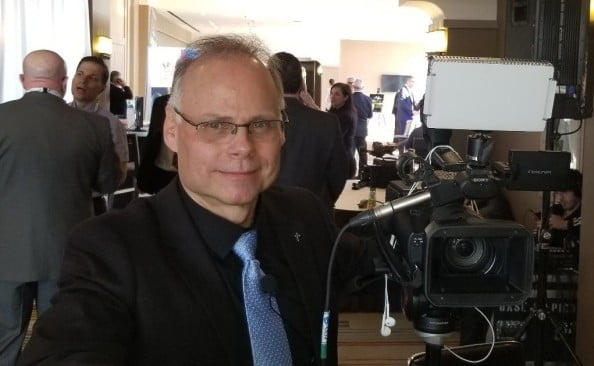Looking at the strategic evolution of procurement, what are some of the key trends you have seen throughout your career?

Ian Thompson, Regional Director, Ivalua
There’s almost a trend over 20 years where it was very much about costs and driving out costs, and then an aspiration to understand how you can get value and innovation from your supply base. Then more laterally, and very recently driven by COVID, seeing more of that innovation and viewing suppliers for their capabilities and what they might be able to do for you, and do for your go to market. It’s a more exciting space, year by year. I would say that for the first three quarters of my career, you go to a procurement conference and one of the key topics is, how do we get at the top table? How do we really have the attention that’s the true C-suite? More recently, businesses are starting to understand the criticality of procurement.

Iain Campbell McKenna, Managing Director, Sourcing Solved:
I read a really interesting report in Harvard Business Review, and it reported that 30% of all organisations had a remote working strategy in place before COVID19. Now, if you think about those stats then, and look at now, virtually everyone at the moment is working from home. It’s interesting, in the initial weeks I had spoken to many CPOs and they reported that they’ve seen productivity increase, some of which had seen up to a 60% increase in productivity from their employees, which is amazing.
From the supplier side, they’ve had more regular face-to-face contact via web conferencing, so it made us talk about stronger relationships with the suppliers. From the standpoint of the skill set for procurement professionals, as well as everyone else, we’re really having to acquire a different mindset and people having higher levels of emotional intelligence and their ability to motivate and work efficiently. It’s easier said than done, because not everyone has the ability to work from home. I think as procurement leaders, they need to reassess how their teams are structured and how to modify that as well as the CEO or the CFO’s criteria when they’re hiring new procurement leaders and how they can adapt.

Jon Hansen, writer and speaker for Procurement Insights:
I’ve got a smile on my face. Kelly Barner and I wrote a book called Procurement at a Crossroads, and one of the things Kelly extracted out from many years ago is that procurement was the place you sent people when you didn’t want to see them anymore. In my early days of procurement people didn’t choose it as a profession as they do today. They fell into it.
It was very much a transactional approach to procurement of achieving the lowest price and being able to deliver value was measured in how much you didn’t spend. These things evolved over time and so now as the profession has moved forward, and as technology has advanced, procurement has moved out of the back office. We’re not no longer an adjunct to finance.
The big change that’s happening, inspired by the COVID-19, is that a lot of the practices that we say we have to improve on we’ve gone beyond that now. Now we’re looking at it from the standpoint of saying supplier relationships aren’t just a nice idea, they’re becoming essential. We have to manage contracts more effectively. We may have to extend DSOs. All of these things, the financial risk and gain of the suppliers become the buyer’s financial risk and gain. What this has done is magnified the importance of some of those long standing things.
If we progress towards a new tomorrow for lack of a better word, procurement and supply chain management are being called to step into the light and take leadership, not only in the areas of procuring or acquiring goods and services, but managing and setting the tone for budgeted savings. Managing payables, managing risk, rather than talking about risk and dealing with it, actually getting ahead of risk.
Technology has evolved and with that comes a plethora of buzzwords and solutions so how do you cut through that noise and apply a procurement lens to it?
Ian Thompson:
I think there’s just so many buzzwords from Procurement transformation, Blockchain and AI, but what does all this mean? There’s a couple of things you can do. One is actually being brave enough to be honest and say, “Well, what is procurement transformation or digital transformation? What does that actually mean? What’s the benefit of that? Is it a journey or is it something that you can achieve?”
I was actually asked to lead a conversation with CPOs about Blockchain and I actually started off by saying that my 13 year old son had asked me the night before what Blockchain was and that was a challenge. I actually put the challenge out to those CPOs; imagine I’m 13 and explain why we as procurement professionals are even talking about Blockchain. Be brave enough to be the one that calls the emperor’s new clothes in some of these things. Because if there aren’t outcomes, and it’s not clear what you’re trying to achieve, then the technology is irrelevant.
It is massively about people and relationships. That is the core of it. A CPO, with their experience and their relationship skills is not going to be replaced by AI anytime soon. Yes, some relatively simple tasks might be taken out of the transaction side of procurement. Think honesty about these things, from our understanding of them and the vendor’s understanding, and think about the community and what can be achieved and what can’t be.
Jon Hansen:
I’m going to put on my high tech hat, because I go back to the days of punch cards and chads and CPM and pick commands, long before DOS and Windows and high tech was what it was. From a technological standpoint, the progression of technology has been nothing short of amazing. No one can dispute that the technology works. McKinsey did a survey which said that out of the 1650 executives of incumbent companies, globally, only 20% had a digital strategy. Only 2% of those had a strategy relating to their supply chain. Those 2% who do have a strategy relating to their supply chain, according to a Deloitte 2019 survey, are dissatisfied with the results from their digital transformation. Now why am I sharing this information? Because the failure of digital or e-procurement initiatives has little to do with technology. Talking with CPOs today, it has more to do with the fact that it is people that drive the transformation within an organisation. The cultures within the organisations have to shift before technology can be fully leveraged. I don’t care how advanced it is.
No one questions whether the technology will work. What they’re questioning is how do we make it work? That starts with things like how do you develop teams to progress procurement from a practical side, beyond the technology?
It isn’t a question of technology anymore, it’s a question of the ability of organisations, both on the practitioner, and the provider side, to focus on what needs to be done from a people standpoint, to facilitate change and full utilization of that technology. Until we address that majority who aren’t satisfied with their digital transformation results, it will continue to be a problem.
Tell me about the reaction you have seen from CPOs with regards to the early days of the COVID19 pandemic?
Ian Thompson:
It’s been impressive. I sat on a roundtable get together with CPOs from across the UK and there was the delivery network of a big manufacturer of food, there was a construction company that’s keeping the roads and sanitation going and there were people involved in entertaining the nation. When I heard what they’d been through to make sure there was continuity of supply to make sure the country was getting the things that we need and the cooperation with each other was genuinely impressive and heart warming, I thanked them then and I thank them now.
Instead of seeing a supplier as somebody who has a set of products or services that are line items, people are actually seeing suppliers and asking; what can they do? Thinking what’s possible, what can be done. I think it’s really important that none of us say we’ve got the answers. It’s a very big, serious, and sad situation and no vendor module or Big Four advice is going to fix it overnight. What’s going to fix it is society working together on the problem.
Iain Campbell McKenna:
I spoke to one CPO who, as soon as COVID-19 happened and their government actioned that everybody’s got to be in self isolation, he set up groups for his teams that saw weekly training and dress up sessions and about 95% of the staff attended. He put a real effort into making sure that his whole team felt inclusive and they felt that they weren’t in isolation, they were still part of a team. I think procurement professionals really require new skills now and so do new procurement leaders. As a result, I think assessing where both current and prospective leaders are from a standpoint of being able to manage a remote team is really essential and provide some sort of characteristics as to what makes an excellent remote leader, and how that differs from the standards of managing teams in the office from nine to five. I have seen quite a dynamic shift in these leaders being able to manage those teams effectively and that was a surprise that they’ve stepped up to the plate and they took the bull by the horns and made that happen, and done it really well.
Jon Hansen:
I think the inherent skills we’ve needed to do the job, not only before now but through this crisis and other crises, we’ve all been aware of them. But we haven’t acted on them. That’s the general consensus. A survey found that 63% of CPOs who responded to the survey indicated that they didn’t think their current procurement teams possessed the necessary skill sets to deliver on their strategic objectives. Think of that. That’s before COVID hit.
Now, what we’re dealing with is the transformation of procurement and that means that the skills have always been there to some degrees with a great deal of latency, but certainly compromised by the continuing insistence that we are a cost reduction vehicle rather than a strategic vehicle for an organisation. Within the ranks of the CPO in the procurement world, I think the realization is that we’ve known what we need to do. We even know in many instances the skills we need to have. But we haven’t developed them. We’ve been confined by the definitions of external factors, of how our role in the enterprise has been traditionally even though there’s been the general recognition of procurement strategic importance over the years has increased gradually.
What COVID has done, if anything, is it’s elevated the awareness of just how important procurement is. With this elevation comes a new recognition of how we have to further capitalise on those skill sets which we already have and build on the ones that we know we have, but haven’t utilised.











